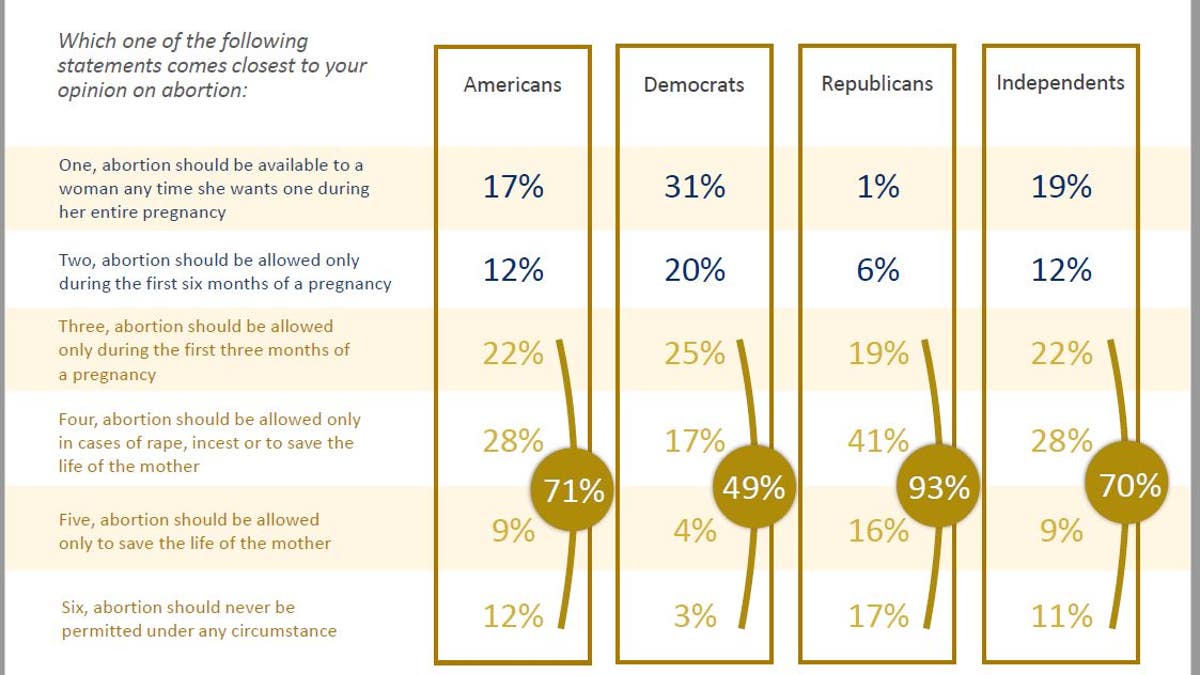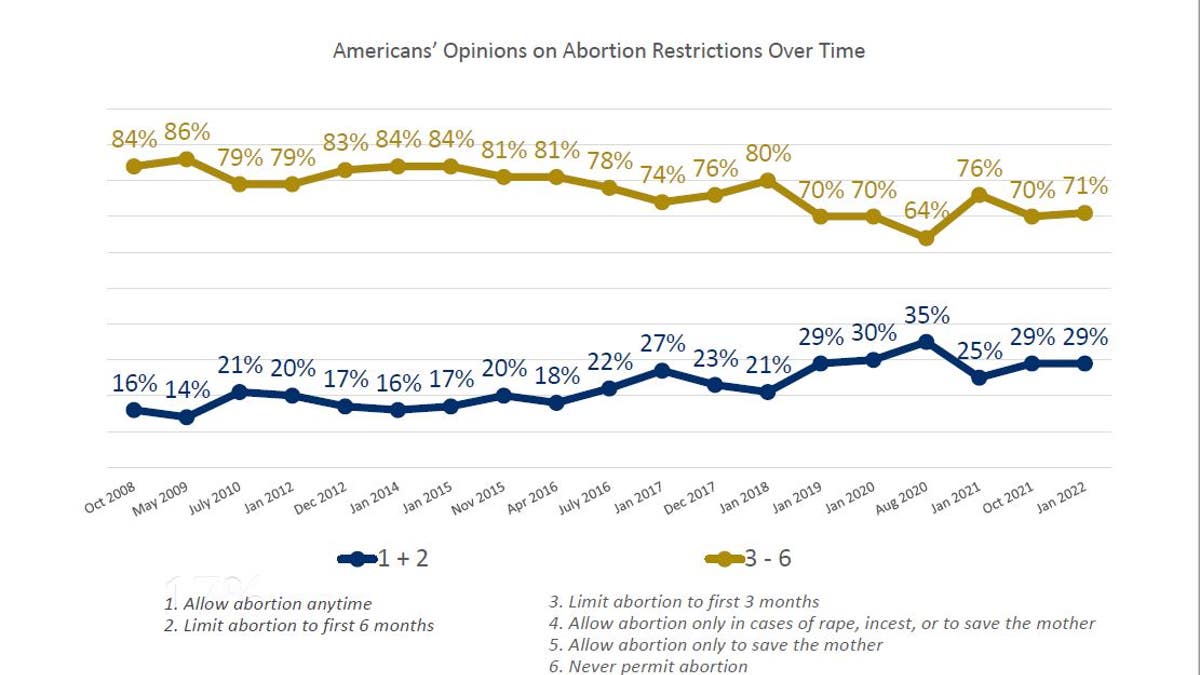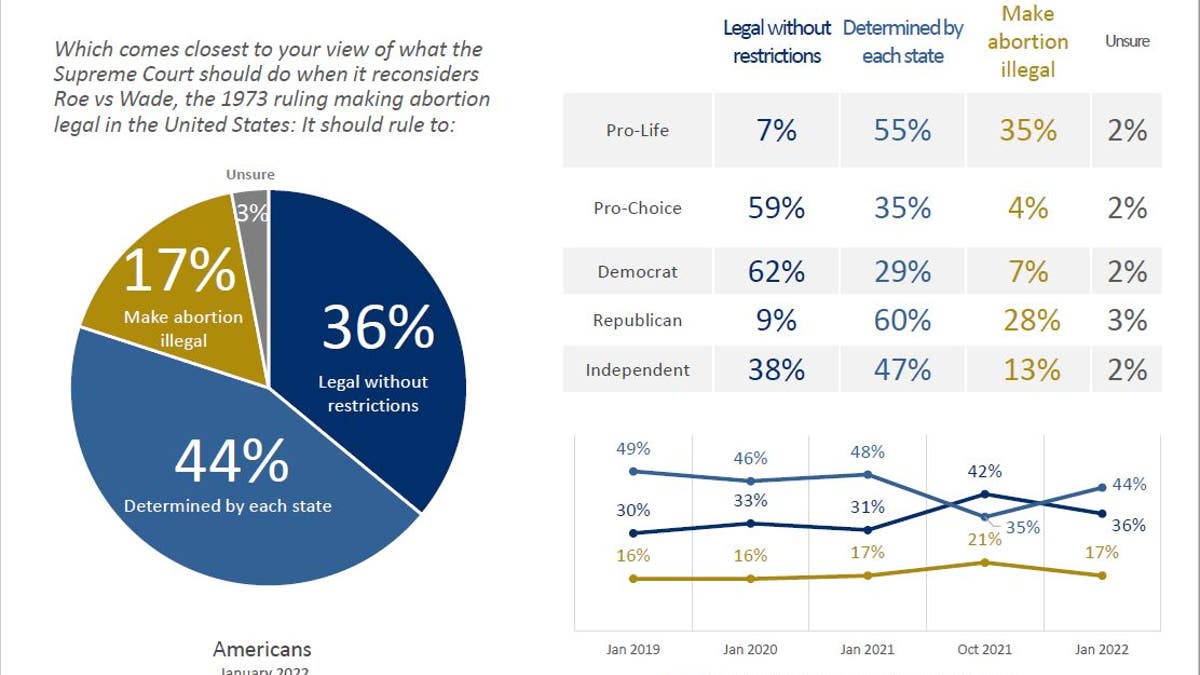Texas abortion law stands: Supreme Court
Alexandria Hoff describes the latest Supreme Court ruling on Texas' abortion law and the continuing legal challenges on 'Special Report.'
The vast majority of Americans support restrictions on abortion, according to a new poll sponsored by the Knights of Columbus and conducted by Marist Poll. The poll also found that a majority of Americans want to return abortion restrictions to the states, in contrast to the central ruling of Roe v. Wade (1973).
"When it comes to the direction of government policy, there has been consistency and consensus in American public opinion on the issue of abortion over the decades," Dr. Barbara Carvalho, director of the Marist Poll, said in a press release on the results.
"As we await a decision in the Supreme Court case Dobbs v. Jackson Women’s Health Organization, our polling continues to show that over 60% of Americans reject the central holding of Roe v. Wade, and want to return the decision to the states or make abortion illegal," Knights of Columbus Supreme Knight Patrick Kelly said in the release. Dobbs v. Jackson centers on whether all pre-viability restrictions on elective abortion are unconstitutional.
PRO-LIFE ADVOCATES RIP KAMALA HARRIS' PREDICTION THAT ‘WOMEN WILL DIE’ IF ROE V. WADE IS OVERTURNED
The Knights of Columbus-Marist poll does not just ask Americans whether or not they support Roe v. Wade or whether they identify as "pro-life" or "pro-choice," but rather presents in-depth questions about abortion issues, probing Americans' public policy opinions rather than identity markers.
"When asked about their actual opinion, 71% of Americans support real restrictions that are more pro-life than federal law and the laws of many states," Timothy Saccoccia, vice president at the Knights of Columbus, said on a press call regarding the poll. He noted that 54% of Americans identify as "pro-choice," but this label does not translate to a support to unlimited abortion.
The poll presented six options on abortion restrictions: "abortion should be available to a woman at any time she wants one during her entire pregnancy"; "abortion should be allowed only during the first six months of a pregnancy"; "abortion should be allowed only during the first three months of a pregnancy"; "abortion should be allowed only in cases of rape, incest or to save the life of the mother"; "abortion should be allowed only to save the life of the mother"; and "abortion should never be permitted under any circumstance."
Most Americans (71%) said that abortion should be restricted to the first three months of pregnancy (22%) or in other limited circumstances such as rape and incest (28%), to save the life of the mother (9%) or not at all (12%). Only 17% of Americans said abortion should be available during an entire pregnancy and 12% said it should be restricted to the first six months.

Knights of Columbus/Marist poll on abortion restrictions (Knights of Columbus/Marist Poll)
Even almost half of Democrats (49%) supported tight restrictions, with only 31% saying abortion should be available during all nine months of pregnancy. A vast majority of Republicans (93%) supported tight restrictions on abortion, while only 1% said abortion should be available throughout all of pregnancy. Most Independents (70%) also supported tight restrictions, while only 19% said abortion should be available throughout pregnancy.
Support for tight restrictions has remained consistent over time, with between 64% and 86% of Americans supporting restricting abortion to the first three months of pregnancy, cases of rape, incest, or threats to the life of the mother, or banning the practice entirely.

Knights of Columbus/Marist poll on abortion restrictions (Knights of Columbus/Marist Poll)
The poll also found that a plurality of Americans support banning abortion at the point in which the unborn baby can feel pain.
"If abortion remains legal in the United States including for cases of rape, incest, or to save the life of the mother, at which point should abortions for other reasons be limited?" pollsters asked. Forty-two percent of Americans said abortion should be banned at "the point at which a fetus can feel pain," while 36% said it should be banned at "the point at which a fetus can live outside the womb," the position established in Roe v. Wade. Many Americans (11%) said they are unsure on that question.
NEW DEM GROUP AIMS TO ‘PUT THE NAIL IN THE COFFIN OF THE ABORTION INDUSTRY’
Rather than just asking whether respondents support Roe v. Wade or want it overturned, Marist asked respondents what the Supreme Court should do when it considers the Roe v. Wade ruling.
Although 36% of Americans said abortion should remain legal without restrictions, a position more in line with Roe, most Americans (61%) would either have the court make abortion illegal (17%) or have the issue determined by each state (44%), both positions that would involve overturning Roe.
A September Fox News poll found that 65% of Americans said they support Roe v. Wade when asked directly about the decision, not about the specific policy issues.

Knights of Columbus/Marist poll on Roe v. Wade
"Roe v. Wade was wrong when it was decided, and its legacy is the tragic destruction of more than 60 million unborn lives and countless wounded women," Supreme Knight Patrick Kelly said. "The time has come for America to turn the page on Roe."
CLICK HERE TO GET THE FOX NEWS APP
The Marist Poll conducted the survey of 1,004 adults between Jan. 4 and Jan. 9, 2022, in partnership with the Knights of Columbus. Marist selected adults 18 years of age and older residing in the contiguous United States, contacted on landline or mobile numbers and interviewed by telephone using live interviewers. Results are statistically significant within ±3.3 percentage points. There are 849 registered voters. The results for this subset are statistically significant within ±3.6 percentage points.













































